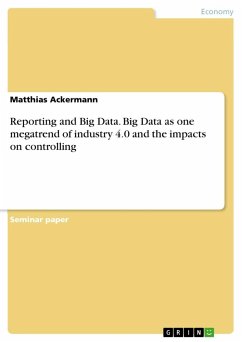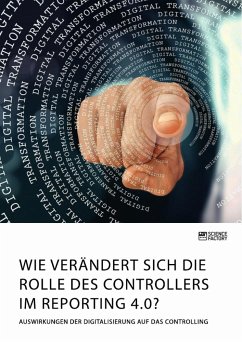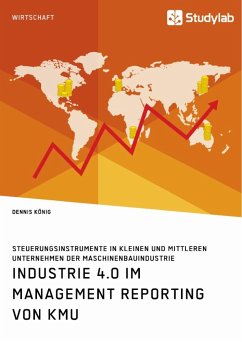
Reporting and Big Data. Big Data as one megatrend of industry 4.0 and the impacts on controlling

PAYBACK Punkte
0 °P sammeln!
Seminar paper from the year 2015 in the subject Business economics - Controlling, FOM Hochschule für Oekonomie und Management gemeinnützige GmbH, Hochschulstudienzentrum Freiburg (business administration), course: International Investment and Controlling, language: English, abstract: The global data volume is expected to increase fiftyfold over the next ten years (2012-2022). Reasons for extensive growth of data volume within the era of industry 4.0 are the increased use of sensor technology in production and logistics as well as the extensive distribution and the use of mobile Internet. (IC...
Seminar paper from the year 2015 in the subject Business economics - Controlling, FOM Hochschule für Oekonomie und Management gemeinnützige GmbH, Hochschulstudienzentrum Freiburg (business administration), course: International Investment and Controlling, language: English, abstract: The global data volume is expected to increase fiftyfold over the next ten years (2012-2022). Reasons for extensive growth of data volume within the era of industry 4.0 are the increased use of sensor technology in production and logistics as well as the extensive distribution and the use of mobile Internet. (ICA 2014, p. 3) But the explosion of data is not new. It continues a trend that started in the 1970s. Changes are the velocity of growth, the diversity of data, and the imperative to make better use of information in business. To harvest and harness every byte of relevant data and use it to make the best decisions is the hopeful vision of organizations in terms of big data. (McKinsey 2013, p. 15) On the one hand, opportunities of big data can be identified in all industries over the entire value chain. On the other hand, many companies are sceptical of big data because of high investment costs, the lack of skilled staff and know-how, and privacy risks. That causes delays in big data´s implementation in companies. The careful analysis of the application, and the identification of realizable excess values of big data is one of the controller's tasks. Completely new opportunities and challenges for the controller arise due to the massive growth of data. Though in future the positions of business analysts and data scientists overlap with the controllers' skills and fields of activity. (ICA 2014, p. 3) This assignment gives an overview of big data itself and illustrates the potential in controlling and for the controller. Additionally challenges, threats and risks are determined.













